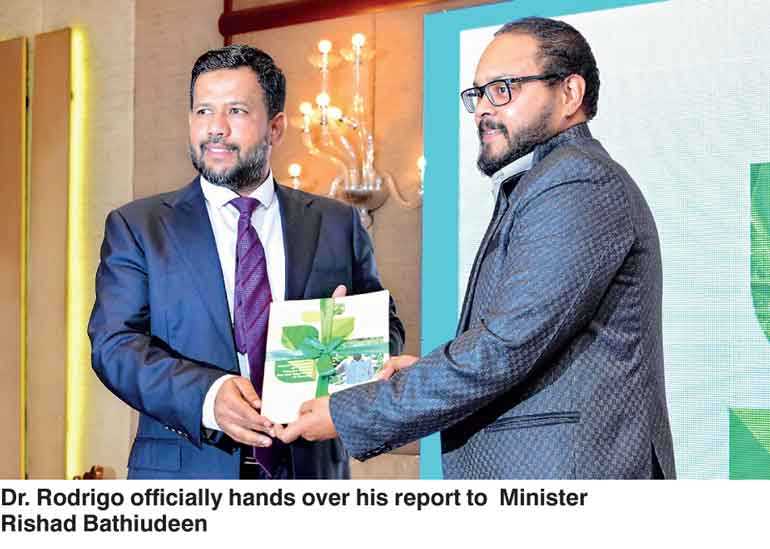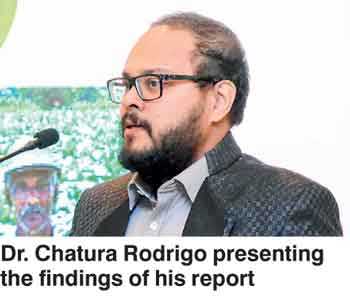Wednesday Feb 18, 2026
Wednesday Feb 18, 2026
Friday, 29 June 2018 00:00 - - {{hitsCtrl.values.hits}}

Green Space Consultancies (GSC) launched an Agri-Economic research report on Tuesday on the topic “Understanding Farmer Perspectives on Proposed Tobacco Growing Ban and Opportunity to Diversify.” The report was the culmination of a study conducted with the objective of understanding how tobacco farmers in the country perceive the proposed 2020 tobacco cultivation ban, its impact on their livelihoods, and their expectations on alternative crops or income sources.
A copy of the report was handed over to Minister of Agriculture Mahinda Amaraweera on Friday, 22 June. Speaking at the handover event, Minister Mahinda Amaraweera said, “Agriculture is the livelihood of the majority in the rural sector and plays a key role in alleviating rural poverty. I commend Dr. Chatura for taking the initiative to research farmers’ perceptions on the cultivation ban and for highlighting what critical factors need to be considered before tobacco farmers can be asked to move to alternative crops.”
A copy of the report was also officially handed over to Minister of Industry and Commerce Rishad Bathiudeen at the launch event. Speaking at the event, Minister Bathiudeen stated, “The proposed new crop models by Dr. Chatura Rodrigo are commendable since they recommend high income export crops such as Okra for these tobacco farmers so that their high (profit) margins shall continue and shall bring positive benefits to the exports sector as well. Therefore we believe that this “crop switching” will have only minimal effects if these models are used by tobacco farmers.”
Since the ban is not in effect yet, the research conducted by GSC looked at perceived impacts on their socio-economic conditions, possible actions to mitigate these perceived impacts and necessary conditions for implementing actions. The research looked in to three different tobacco value chains: (1) tobacco grown for smokeless tobacco products (SLT), (2) tobacco grown for beedi and cigars, (3) tobacco grown for cigarette manufacturing. Beedi and cigar value chains were looked at from a beedi and cigar rollers and traders point of view since they use tobacco grown for SLT products (most come from Northern region of the country) and imported leaves. SLT products value chain and the beedi and cigar value chains were explored using qualitative research tools only, while both qualitative research and a household survey were employed for farmers who grow tobacco for cigarette manufacturing.
All these value chains are heavily dependent on tobacco grown in the country. These farmers have been involved with these value chains for a long time. They earn a substantial disposable income by engaging in the value chain. Their socio-economic conditions have gone up significantly because of the healthy income they earn from growing tobacco. Implementing a cultivation ban will displace these farmers and have serious consequences on their lives. Therefore, it is of utmost importance that they look for alternative livelihoods.
However, it was noticed that these farmers have not seriously thought about any alternatives and are not quite sure about the certainty of the proposed ban – largely due to the indirect messages they receive through media only, rather than hearing something concrete from the policy makers. This shows the information asymmetry and the uncertainty created by it. They wish that the government would be more direct and open about these policy decisions and that responsible authorities take the necessary action in developing a dialog with affected farmers to understand the impacts and develop mitigation measures of these policy decisions.
 While farmers see different actions that can be taken to mitigate impacts of these policy decisions, they are not clear as to what actions are most feasible and who should lead in implementing them. For example, farmers talked about crop diversification, however they are not sure what market mechanisms are in place to make sure that they are not worse off by adopting those diversifications. Farmers who grow tobacco for cigarette manufacturing are used to forward contracts with guaranteed prices and a market place; therefore, they expect a value chain that provides them the same conditions. However, farmers believe they need support from the government in identifying feasible diversification options.
While farmers see different actions that can be taken to mitigate impacts of these policy decisions, they are not clear as to what actions are most feasible and who should lead in implementing them. For example, farmers talked about crop diversification, however they are not sure what market mechanisms are in place to make sure that they are not worse off by adopting those diversifications. Farmers who grow tobacco for cigarette manufacturing are used to forward contracts with guaranteed prices and a market place; therefore, they expect a value chain that provides them the same conditions. However, farmers believe they need support from the government in identifying feasible diversification options.
Policies affect either the demand, supply or both, of goods and services. Tobacco, which is an agricultural crop, is only one component of smokeless tobacco products, beedi, cigars and cigarettes – however, the most important one. If the purpose of the cultivation ban is to reduce the consumption of these products for health reasons, then policy makers either can implement a policy to reduce the demand or supply of raw materials or do both. The proposed tobacco growing ban only looks at restricting the supply side. Therefore, before implanting such a ban, policy makers should clearly identify the impacts and propose possible mitigation measures following a careful feasibility analysis.
What is needed is evidence-based policy making. A proper research is needed to understand and quantify possible impacts. Then, alternative income sources including crop diversification needs to be evaluated upon taking market conditions in to consideration. By this, policy makers will be able to come up with an appropriate transition plan for tobacco farmers. This study identified farmer perceptions on the impacts and actions against the impacts. It has also proposed different diversification options in terms of agricultural value chains. Policy makers should take this study as a framework to implement an evidence-based policy successfully.
Pix by Lasantha Kumara